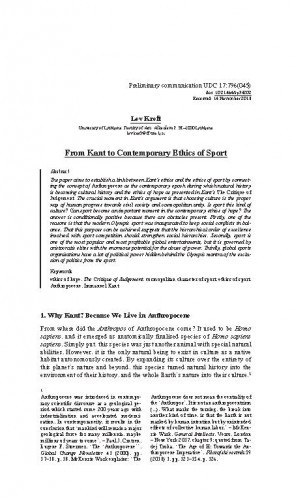The paper aims to establish a link between Kant’s ethics and the ethics of sport by connecting the concept of Anthropocene as the contemporary epoch during which natural history is becoming cultural history and the ethics of hope as presented in Kant’s The Critique of Judgement. The crucial moment in Kant’s argument is that choosing culture is the proper way of human progress towards civil society and cosmopolitan unity. Is sport this kind of culture? Can sport become an important moment in the contemporary ethics of hope? The answer is conditionally positive because there are obstacles present. Firstly, one of the reasons is that the modern Olympic sport was inaugurated to keep social conflicts in balance. That this purpose can be achieved suggests that the hierarchical order of excellence involved with sport competition should strengthen social hierarchies. Secondly, sport is one of the most popular and most profitable global entertainments, but it is governed by aristocratic elites with the enormous potential for the abuse of power. Thirdly, global sports organisations have a lot of political power hidden behind the Olympic mantra of the exclusion of politics from the sport.; Radom se nastoji uspostaviti veza između Kantove etike i etike sporta povezivanjem koncepcije anthropocena, kao suvremene epohe tijekom koje prirodna povijest postaje kulturnom povijesti, s etikom nade, kako je predstavljena u Kantovoj Kritici rasudne snage. Ključan je moment Kantova argumenta da je biranje kulture ispravan put ljudskog razvitka prema civilnom društvu i kozmopolitskom jedinstvu. Je li sport takva kultura? Može li sport postati važan moment u suvremenoj etici nade? Odgovor je uvjetno pozitivan jer postoje određene prepreke. Prvo, jedan je od razloga za to inauguriranje olimpijskog sporta u svrhe održavanja ravnoteže u društvenim sukobima. Da je takvo što ostvarivo sugerira nam da bi hijerarhijski poredak izvrsnosti u sportskom natjecanju osnažio društvenu hijerarhiju. Drugo, sport je jedna od najpopularnijih i najprofitabilnijih globalnih zabava, no njime upravlja aristokratska elita s iznimnim potencijalom za zloupotrebu moći. Treće, globalni organizatori sporta imaju mnogo političke moći skrivene iza olimpijske mantre o isključivanju politike iz sporta.; Das Paper zielt darauf ab, eine Verbindung zwischen Kants Ethik und der Ethik des Sports herzustellen, indem es die Konzeption des Anthropozäns als zeitgenössische Epoche, während welcher Naturgeschichte zur kulturellen Geschichte wird, und die Ethik der Hoffnung, wie sie in Kants Kritik der Urteilskraft dargestellt wird, miteinander verknüpft. Das entscheidende Moment in Kants Argumentation ist, dass die Wahl der Kultur der richtige Weg des menschlichen Fortschritts zur Zivilgesellschaft und zur kosmopolitischen Einheit ist. Ist Sport eine solche Kultur? Kann Sport zu einem wichtigen Moment in der zeitgenössischen Ethik der Hoffnung werden? Die Antwort ist lediglich unter Vorbehalt positiv, da Hindernisse vorhanden sind. Erstens ist einer der Gründe dafür, dass der moderne olympische Sport ins Leben gerufen wurde, um soziale Konflikte im Gleichgewicht zu halten. Dass dieser Zweck erreicht werden kann, legt nahe, dass die hierarchische Reihenfolge der Spitzenleistungen im Sportwettbewerb die sozialen Hierarchien stärken würde. Zweitens ist Sport eine der beliebtesten und profitabelsten Unterhaltungsformen der Welt, die allerdings von aristokratischen Eliten mit einem enormen Potenzial für Machtmissbrauch beherrscht wird. Drittens haben globale Sportorganisationen hinter dem olympischen Mantra des Ausschlusses der Politik aus dem Sport reichlich politische Macht verborgen.; Cet article tente d’établir un lien entre l’éthique kantienne et l’éthique du sport à travers le concept d’Anthropocène, en tant qu’époque contemporaine au sein de laquelle l’histoire naturelle devient l’histoire culturelle, mais également à travers l’éthique de l’espoir, telle qu’elle est présentée dans la Critique de la faculté de juger de Kant. Le moment charnière de l’argumentation kantienne pose que la culture est le chemin de l’évolution humaine qui mène à la société civile et à l’unité cosmopolitique. Le sport est-il une culture de la sorte ? Le sport peut-il devenir un moment important au sein de l’éthique contemporaine de l’espoir ? La réponse est positive sous réserve d’un ensemble de conditions puisqu’il existe un certain nombre d’obstacles : premièrement, le sport olympique a été inauguré dans le but de maintenir les conflits sociaux en équilibre. Pour qu’un tel projet se réalise, cela suggère que l’ordre hiérarchique d’excellence dans la compétition sportive pourrait renforcer la hiérarchie sociale ; deuxièmement, bien qu’il soit régi par une élite aristocratique qui détient en son sein un énorme potentiel d’abus de pouvoir, le sport est l’un des divertissements mondiaux les plus populaires et profitables ; troisiè- mement, les organisations mondiales du sport possèdent un pouvoir politique qui se dissimule derrière les slogans olympiques qui revendiquent l’exclusion du politique dans le sport.
Sažetak

 Synthesis philosophica : 34,2(2019) / editor-in-chief Ante Čović.
Synthesis philosophica : 34,2(2019) / editor-in-chief Ante Čović.